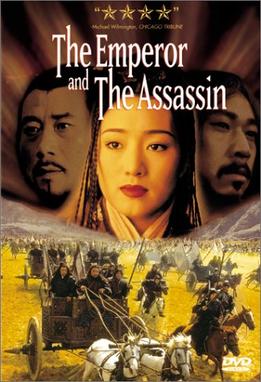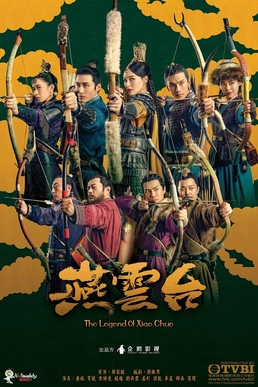
The Emperor and the Assassin, also known as The First Emperor, is a 1998–1999 Chinese historical romance film based primarily on Jing Ke's assassination attempt on the King of Qin, as described in Sima Qian's Records of the Grand Historian. The film was directed by Chen Kaige and stars Gong Li, Zhang Fengyi, Li Xuejian, and Zhou Xun. The film was well received critically and won the Technical Prize at the 1999 Cannes Film Festival. It was the most expensive Chinese film made up to that time, costing US$20 million.

Three Times is a 2005 Taiwanese film directed by Hou Hsiao-hsien. It consists of three separate stories of romance, set in different eras, using the same lead actors, Shu Qi and Chang Chen. In "A Time for Love," set in 1966, a soldier (Chang) meets an alluring pool-hall hostess (Shu). "A Time for Freedom," set in 1911, focuses on a courtesan's relationship with a freedom fighter during the Japanese occupation of Taiwan. In "A Time for Youth," set in 2005, a singer forsakes her female lover for a photographer with whom she's having an affair.

Edward Yang was a Taiwanese filmmaker. He rose to prominence as a pioneer in the Taiwanese New Wave of the 1980s, alongside fellow auteurs Hou Hsiao-hsien and Tsai Ming-liang. Yang was regarded as one of the greatest filmmakers of Taiwanese cinema. He won the Best Director Award at Cannes for his 2000 film Yi Yi.

Romance of the Three Kingdoms is a Chinese television series adapted from the classical 14th century novel of the same title by Luo Guanzhong. The series was produced by China Central Television (CCTV) and was first aired on the network in 1994. It spanned a total of 84 episodes, each approximately 45 minutes long. One of the most expensive television series produced at the time, the project cost 170 million yuan. It was completed over four years and involved over 400,000 cast and crew members, including divisions of the People's Liberation Army from the Beijing, Nanjing and Chengdu military regions. Some of the dialogue spoken by characters was adapted directly from the novel. Extensive battle scenes, such as the battles of Guandu, Red Cliffs and Xiaoting, were also live-acted.

Death Duel is a 1977 Hong Kong wuxia film directed by Chor Yuen under the Shaw Brothers Studio banner. The film stars Derek Yee, Ling Yun, and marked the debut of Candice Yu for Shaw Studio where she plays a prostitute. The film based on the Gu Long's novel of the same name. It was remade in 2016 as Sword Master, directed by Derek Yee.

Royal Tramp is a 2008 Chinese television series adapted from Louis Cha's novel The Deer and the Cauldron. Produced by Zhang Jizhong and Huayi Brothers, the series consists of 50 episodes, filmed in high definition. The series was first broadcast on Jiangsu TV in China in 2008 and was subsequently aired on TVB in Hong Kong and other countries.

The Water Margin is a 1998 Chinese television series adapted from Shi Nai'an's classical 14th-century novel of the same title. It was produced by CCTV with Zhang Jizhong as producer. It was first broadcast in China in January 1998. The series also featured action choreography by Yuen Woo-ping.

Margaret Tu Chuan was a Hong Kong actress.

Journey to the West is a Chinese television series adapted from the 16th-century novel of the same title. Production for the 66 episodes long series started on 12 September 2009, and it was first broadcast in mainland China on 28 July 2011 on TVS. The series was produced by Zhang Jizhong and was released a year later than another television series of the same title, but with a different cast and crew.

Reign of Assassins is a 2010 wuxia film directed by Su Chao-pin and co-directed by John Woo. The film is shot in China and set during the Ming Dynasty. The film stars Michelle Yeoh, who plays an assassin who tries to return to a normal life after being counseled by a monk. After saving her husband and herself from robbers, she attracts the attention of her former assassin gang.

Justice Bao is a Chinese TV series starring producer Jin Chao-chun as the Song dynasty official Bao Zheng. The series ran for 3 seasons from 2010 to 2012. In addition to Jin, Kenny Ho, Fan Hung-hsuan and Lung Lung again reprise their iconic roles from the 1993 Taiwanese hit Justice Pao and the 2008 Chinese series Justice Bao.

The Seven Heroes and Five Gallants is a 1994 Taiwanese television series produced by Chinese Television System (CTS) a few months after its prequel Justice Pao, which was also produced by Chao Ta-shen. Dozens of actors appeared in both series, but only Sze Yu and Tu Man-sheng reprised their roles. Fan Hung-hsuan and Lung Lung chose to portray new characters rather than their iconic roles.

Su Dongpo is a 2012 Chinese historical TV series produced by China Central Television. It was first shown in 2012, although it was filmed in 2007.

How Much Sorrow Do You Have, also known as The Real Warrior in some countries, is a 2005 Chinese historical drama produced by Beijing HualuBaina Film & TV Co. It was first broadcast on China Television in Taiwan in August 2005. In mainland China it was first broadcast on CCTV-8 in 2006. The title is directly taken from a poem by Li Yu, the protagonist of the drama.
Miao Tien was a Chinese film actor mostly active in Hong Kong and Taiwan.

The Heart of Woman, also known as Women, is a Taiwanese Hokkien television series that began airing on SET Taiwan in Taiwan on 21 November 2012, from Mondays to Fridays, and ends on 21 November 2013, lasting one year with a total of 262 episodes.

The Qin Empire III is a 2017 Chinese television series based on Sun Haohui's novel of the same Chinese title, which romanticizes the events in China during the Warring States period primarily from the perspective of the Qin state under King Zhaoxiang. It was first aired on CCTV-1 in mainland China in 2017. It was preceded by The Qin Empire (2009) and The Qin Empire II: Alliance (2012) and followed by The Qin Empire IV (2019), which were also based on Sun Haohui's novels.

The Legend of Xiao Chuo is a 2020 Chinese television series based on the novel Yan Yun Tai by Jiang Shengnan. It stars Tiffany Tang in the title role, along with Shawn Dou, Charmaine Sheh and Jing Chao. The series chronicles the life of legendary Empress Xiao Yanyan.

















